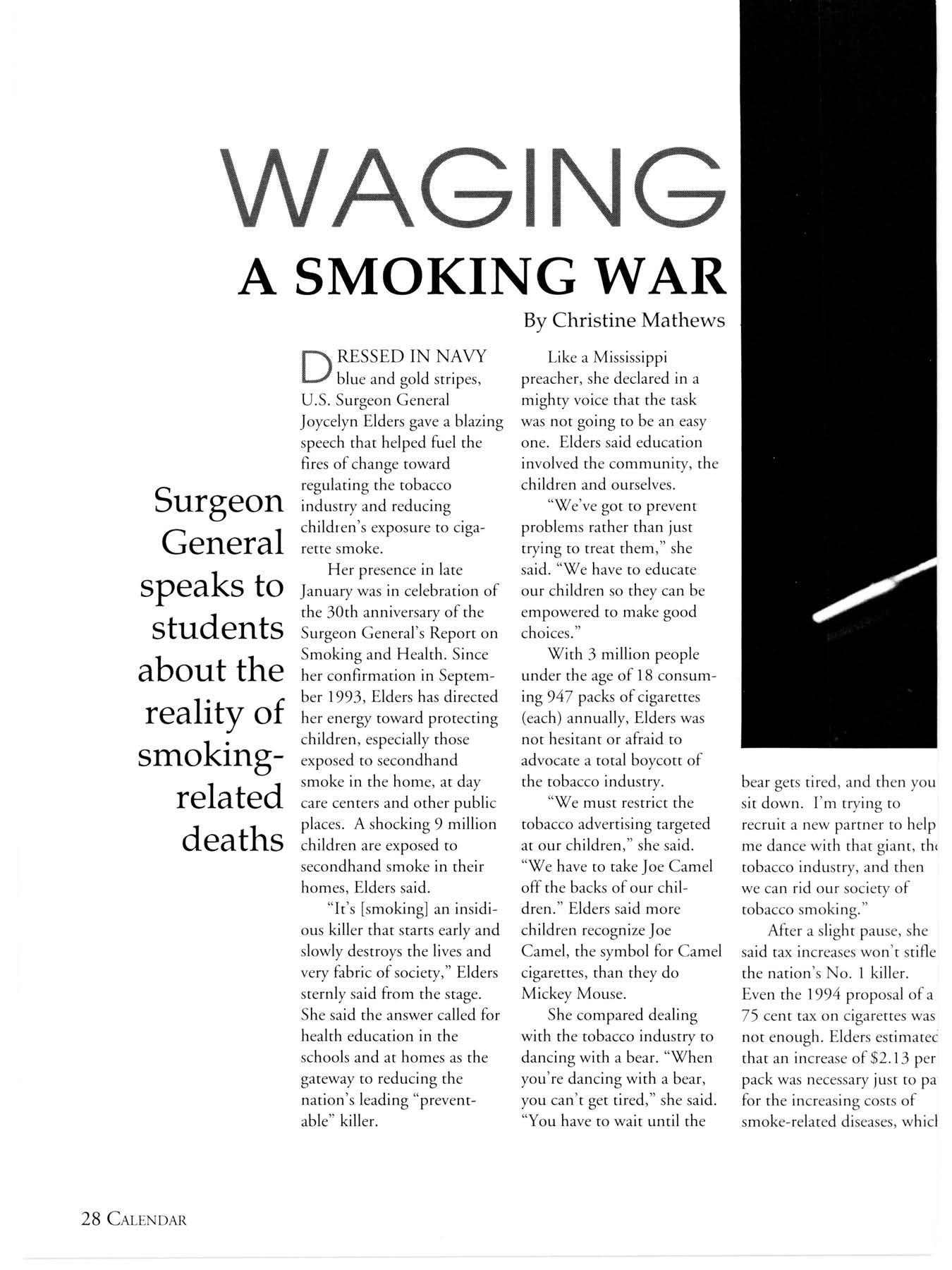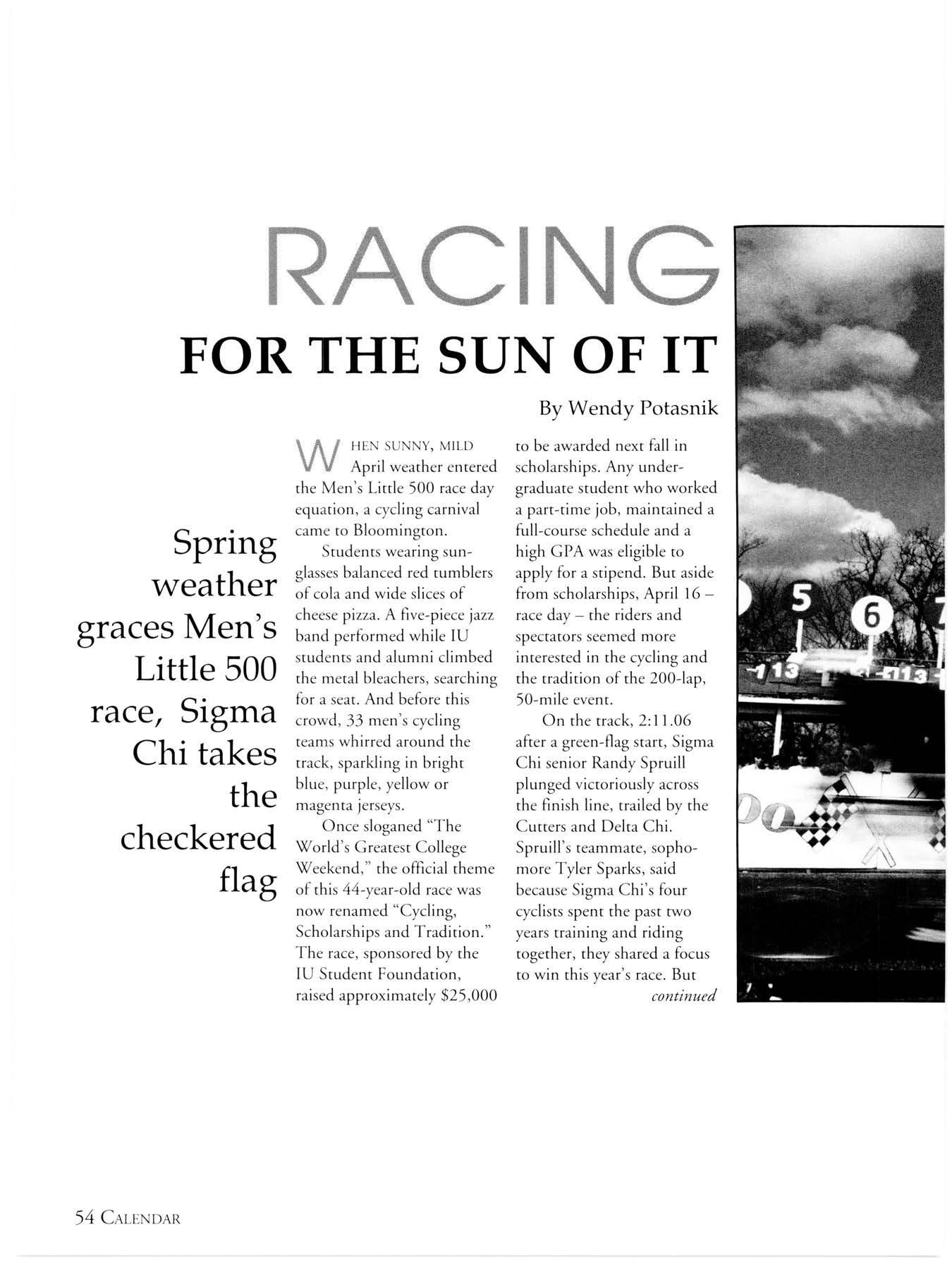
3 minute read
Surgeon General
A
A SMOKING WAR
By Christine Mathews
Surgeon General speaks to students about the reality of smokingrelated deaths
D
RESSED IN NAVY blue and gold stripes, U.S. Surgeon General Joycelyn Elders gave a blazing speech that helped fuel the fires of change toward regulating the tobacco industry and reducing children's exposure to cigarette smoke.
Her presence in late January was in celebration of the 30th anniversary of the Surgeon General's Report on Smoking and Health. Since her confirmation in September 1993, Elders has directed her energy toward protecting children, especially those exposed to secondhand smoke in the home, at day care centers and other public places. A shocking 9 million children are exposed to secondhand smoke in their homes, Elders said. "It's [smoking] an insidious killer that starts early and slowly destroys the lives and very fabric of society," Elders sternly said from the stage. She said the answer called for health education in the schools and at homes as the gateway to reducing the nation's leading "preventable" killer.
Like a Mississippi preacher, she declared in a mighty voice that the task was not going to be an easy one. Elders said education involved the community, the children and ourselves. "We've got to prevent problems rather than just trying to treat them," she said. "We have to educate our children so they can be empowered to make good choices."
With 3 million people under the age of 18 consuming 947 packs of cigarettes (each) annually, Elders was not hesitant or afraid to advocate a total boycott of the tobacco industry. "We must restrict the tobacco advertising targeted at our children," she said. "We have to take Joe Camel off the backs of our children." Elders said more children recognize Joe Camel, the symbol for Camel cigarettes, than they do Mickey Mouse.
She compared dealing with the tobacco industry to dancing with a bear. "When you're dancing with a bear, you can't get tired," she said. "You have to wait until the bear gets tired, and then you sit down. I'm trying to recruit a new partner to help me dance with that giant, th( tobacco industry, and then we can rid our society of tobacco smoking."
After a slight pause, she said tax increases won't stifle the nation's No. 1 killer. Even the 1994 proposal of a 75 cent tax on cigarettes was not enough. Elders estimatec that an increase of $2.13 per pack was necessary just to pa for the increasing costs of smoke-related diseases, whicl
:count for $69 million in icreased health care costs.
Elders did commend IU )r its smoke-free campus olicy that was initiated in fovember 1993. The UniN.sity ban only allows noking in residence halls -id hotel rooms at the IMU.
Though Elders' visit to .1 focused on smoking, her ews on other issues came to le forefront.
While Elders' voice Domed, a handful of prosters marched in front of te IU Auditorium carrying signs about the deaths caused by abortion. "We just want her to take a consistent stand on senseless deaths," said a protester. "We want her for life across the board." Other students attending the speech weren't as offended. "I like her honesty. I think the reason that I enjoyed her speech the most was the fact that she is convinced that what she is doing about the smoking problem in America is the best approach," freshman Angie Ailor said.
Elders also responded to her controversial stance on drug legalization. When Elders advocated the study of drug legalization, the Clinton administration distanced itself from her views. "He is opposed to drug legalization and he is the one who determines the policies of this country," she said.
At the conclusion of her speech, she had helped light a fire of awareness among the students and adminstration on our campus. •

Santiago Flores SURGEON General Joycelyn Elders delivers her speech on the hazards of cigarette smoking in the Auditorium. Because of her stance on the legalization of abortion, Elders' speech was preempted by anti-abortion protestors.










